How to be a vegetarian
Some cookbooks to get you started, if you haven't, or to keep you going, if you have
In her first novel, The Benefactor, Susan Sontag wrote:
I believe that the revolutions of my time have been changes not of government or of the personnel of public institutions, but revolutions of feelings and seeing.
One of the fascinating things about writing about her was to see just how many of these revolutions took place over her lifetime. Ideas about sex and psychology, about economics and war, about photography and dance, about the proper place of women and blacks and homosexuals, about literature and film, Communism and capitalism, Europe and America—all these ideas changed so much that even the words, by the end of her life, meant something entirely different than they did at the beginning.
I have always been intrigued by these changes, and by the moment that they happen. It’s something that I’ve often noted in politics. An obviously terrible politician can enjoy a great deal of popularity for a very long time. Despite the many terrible things he or she does, people seem not to mind. And then, suddenly, and often because of something far less terrible than he or she has been doing for years, everyone turns against this person. Some accumulation of changes deep in the society, invisible at the surface, becomes visible all of a sudden.
What is this moment? It’s hard to say. It wasn’t that long ago that politicians like Barack Obama and Hillary Clinton opposed gay marriage. It really wasn’t, kids!
(I say “kids” because it was recently brought to my attention that a younger friend of mine was not exactly sure who Whitney Houston was. I felt like Methuselah.)
For a long time I have felt that such a revolution of feeling and seeing was operating around the subject of eating animals. This was only anecdotal, but if you’ve been a vegetarian for a long time, you might have noticed it too: that the way people react to you has changed. At the same time, you don’t want to get overly optimistic, since we are very much in the minority. And it’s easy to read too much into a friend’s decision to go meat-free.
And yet.
Just in the last week, since I sent my email about my puppy Basso, three things have happened to make me think that we really are on the cusp of something dramatic.
The first was the announcement that Epicurious was eliminating beef from its recipes. If you’re not familiar with Epicurious, it’s an app that millions of regular Americans use every day on their phones. It’s incredibly convenient, and the recipes are good. They explained their decision:
For any person—or publication—wanting to envision a more sustainable way to cook, cutting out beef is a worthwhile first step. Almost 15 percent of greenhouse gas emissions globally come from livestock (and everything involved in raising it); 61 percent of those emissions can be traced back to beef. Cows are 20 times less efficient to raise than beans and roughly three times less efficient than poultry and pork. It might not feel like much, but cutting out just a single ingredient—beef—can have an outsize impact on making a person’s cooking more environmentally friendly.
Needless to say, I wish they weren’t keeping the poultry and pork, but if you are making an argument purely from the environmental perspective, then this makes a lot of sense. And it goes a long way toward making carnivorism less compulsory: a lot of people will realize that meat is not a normal or harmless product.
Soon thereafter, in the Netherlands, the Technical University of Delft announced that they would no longer be serving any meat at all on campus. This is a big deal because the TU Delft is one of the most avant-garde universities in Europe. Lots of extremely innovative scientists, designers, and engineers come out of this school, and its students and graduates have a disproportionate influence in the Netherlands.
If you’re thinking: who cares about the Netherlands—well, though nobody would guess this, it is, in fact, the second largest agricultural exporter in the world. Yes, bigger than China, bigger than Brazil, bigger than Germany, bigger than Canada. And a lot of the responsibility for this economic success comes from the expertise produced at the TU Delft.
The school did a sustainability study and discovered that food is its second-largest producer of carbon waste, and that by eliminating meat they could go a long way toward their goal of carbon neutrality.
In the article I linked too, they explain that vegetarianism is a growing priority for the Dutch:
A third of all households indicated at the beginning of this year to want to eat less meat … Especially people under 40 think that eating meat every day is no longer ok. People under 30 are even twice as likely to be vegetarians or vegans.
Yesterday, in The New York Times, I read that Eleven Madison was going vegan. I was stunned.
Eleven Madison is often described as the best restaurant in New York. Maybe it is, maybe it isn’t, but the fact is: it’s the kind of restaurant that is so good that you are still thinking about the bread roll five years later, which I know because I am still thinking about that bread roll five years later.
It’s horribly expensive, yes (the prix fixe is $335/person, which actually sounds cheaper than I recall; doesn’t include drinks). Who goes there? Well, usually a mix of tourists from Houston and the kind of Wall Street guys who just illegally resold your mortgage to a website domiciled in Tonga. But, well, lots of restaurants in New York are like that.
The thing is, Eleven Madison is about as far from the hippy Moosewood vegetarian restaurant of my youth as can possibly be imagined. It’s a restaurant for people with money and power, people with influence, people who, a few years ago, would have eaten animals without a second thought. For the management of a restaurant like that to bet that not only will they not lose customers but, more likely, gain them is a huge sign of the way the winds are blowing.
The diners at Eleven Madison couldn’t be more different from Dutch tech students or the home chefs who use Epicurious. But taken together—and note that these three stories just appeared in a single week—you can be forgiven for feeling optimistic that we are on the verge of an important change.
Still, for most people, even if you want to make this change, it can be hard to change the way you cook. You get used to eating a certain way, and it’s hard to change, if only for reasons of inertia. That’s why I wanted to point you to some cookbooks that I love and that, I hope, you will too.
(Note: because so many of my readers are in different countries, I am providing links to Amazon. Needless to say, if you are in the US, please consider supporting independent bookstores through Bookshop.)
Though Princess Diana might have been queen of other hearts, Madhur Jaffrey is the queen of mine. I all but kissed her hand when I got to meet her in Jaipur last year. That’s because I have used her cookbooks for so many years that I feel I have come to know her. Learning from her has been one of the most enriching educational experiences of my life, and I am grateful to her several times a week when I open this book. She has a feel for combining spices that I think only an Indian can have, and she has traveled all over the world in search of recipes that are a constant source of surprise and happiness. This is just one of her books, by the way: she’s almost ninety now, and she’s still writing and cooking. In this and everything else, a model for us all.
When I tell people I live in France, they often say: How sad that you can’t eat anything. The thing is, France has as strong a tradition of vegetarian food as it does of every other kind of food. And it also has such heavenly produce that it’s no surprise that Dusolier has come up with these recipes from all over France. I love this book because it points out all those weird vegetables you find in the markets here but would never know what to do with and says: this is what you do with them.
Batmanglij is an Iranian cook who lives in the United States, and this book introduces you to the food of the Silk Road. Since the Silk Road doesn’t actually exist, this basically means Persian food and the food of the countries around Persia. This book might have more recipes in it that I cook repeatedly cook than any other book (besides those of Madhur Jaffrey).
Madison is an important chef in California who bears the imprint of two of my favorite things in the world, Chez Panisse in Berkeley and Zen Buddhist food. This is a classic that every home cook should have.
Meera Sodha is one of the most promising young Indian chefs, and an advocate for British-Indian cuisine. If that sounds like … eew … well, remember that maybe the best Indian food in the world can be found in the restaurants of London. (OK, assuming these restaurants ever reopen.) The best thing about this book is that she uses many European ingredients but cooks them with Indian techniques. In doing so, she shows just how rich and flexible the Indian tradition is.
If you’ve ever been to Hong Kong, you know that some of the very best vegan food in the world comes from the Chinese Buddhist tradition. This often surprises people who associate Chinese food with meat. Yes! The Chinese use a lot of meat. Unfortunately, so does everyone else! But vegan Chinese food is different from what people who aren’t familiar with this food expect. It’s not just Chinese food with no meat. It’s an entirely separate tradition.
This is a fascinating book, including because a lot of it is taken from the Jain tradition. If you’re not familiar with the Jains, they take vegetarianism to (what some might call) an extreme, not using any plants that have to be killed. So no onions, garlic, carrots — nothing that must be uprooted, a principled stance against the needless destruction life that has produced a very different form of Indian cuisine. It’s fascinating to see how much is left over. This book, the magnum opus of the late Yamuna Devi, is a book you will return to time after time, and will challenge what you think about what and how you eat.
Please, please leave me some comments and tell me what your favorite cookbooks are! This is a subject that is very dear to my heart, and one that, I think, can enrich us all.
And if you’d like to subscribe, which would be kind of you, please click here:

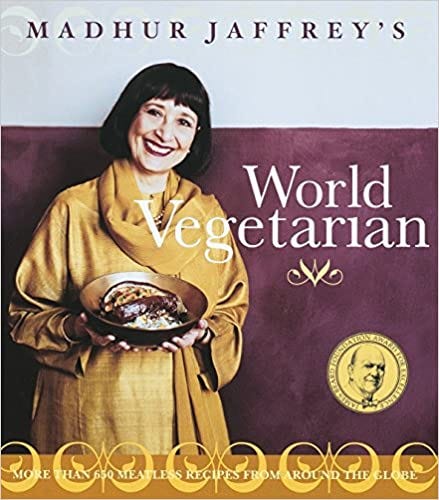
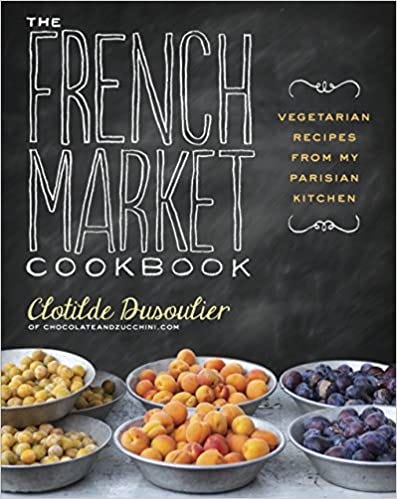
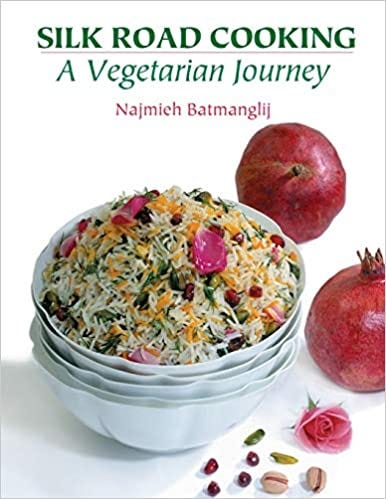
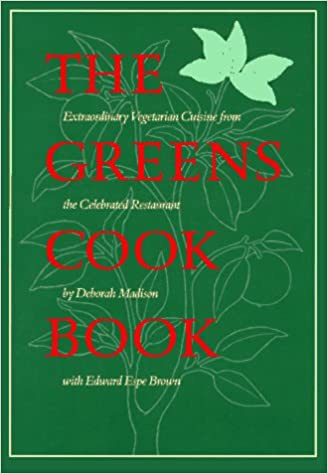
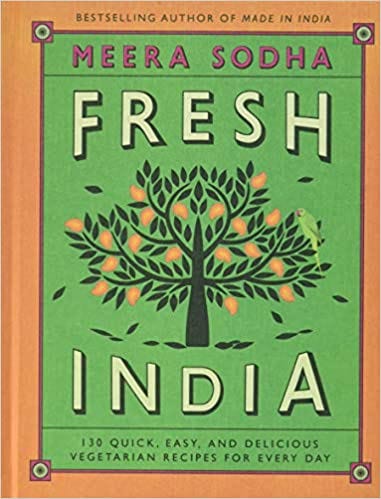
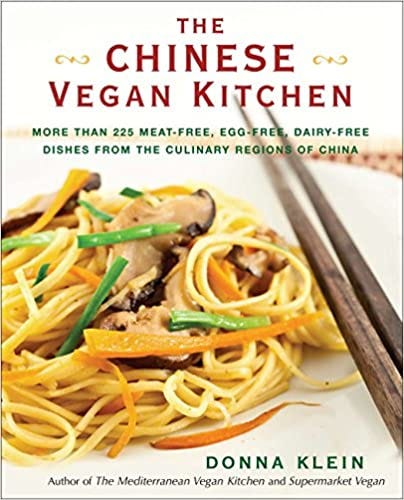
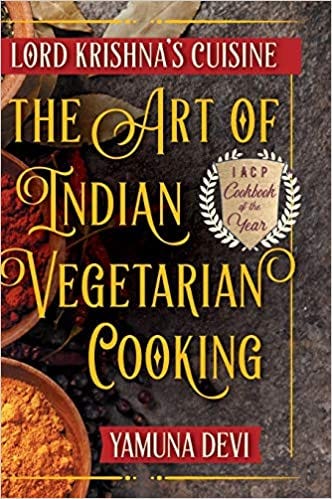
Benjamin, in French : Le défi végane 21 jours, par Élise Desaulniers, Éditions du Trécarré (Montréal, 2016). Élise est directrice de la Société pour la protection de la cruauté envers les animaux qui a aussi fait paraître en 2017 le recueil Saveurs véganes, au profit de la SPCA de Montréal.
Thank you for the generous information. Bless you and your dog whose name I forgot :))